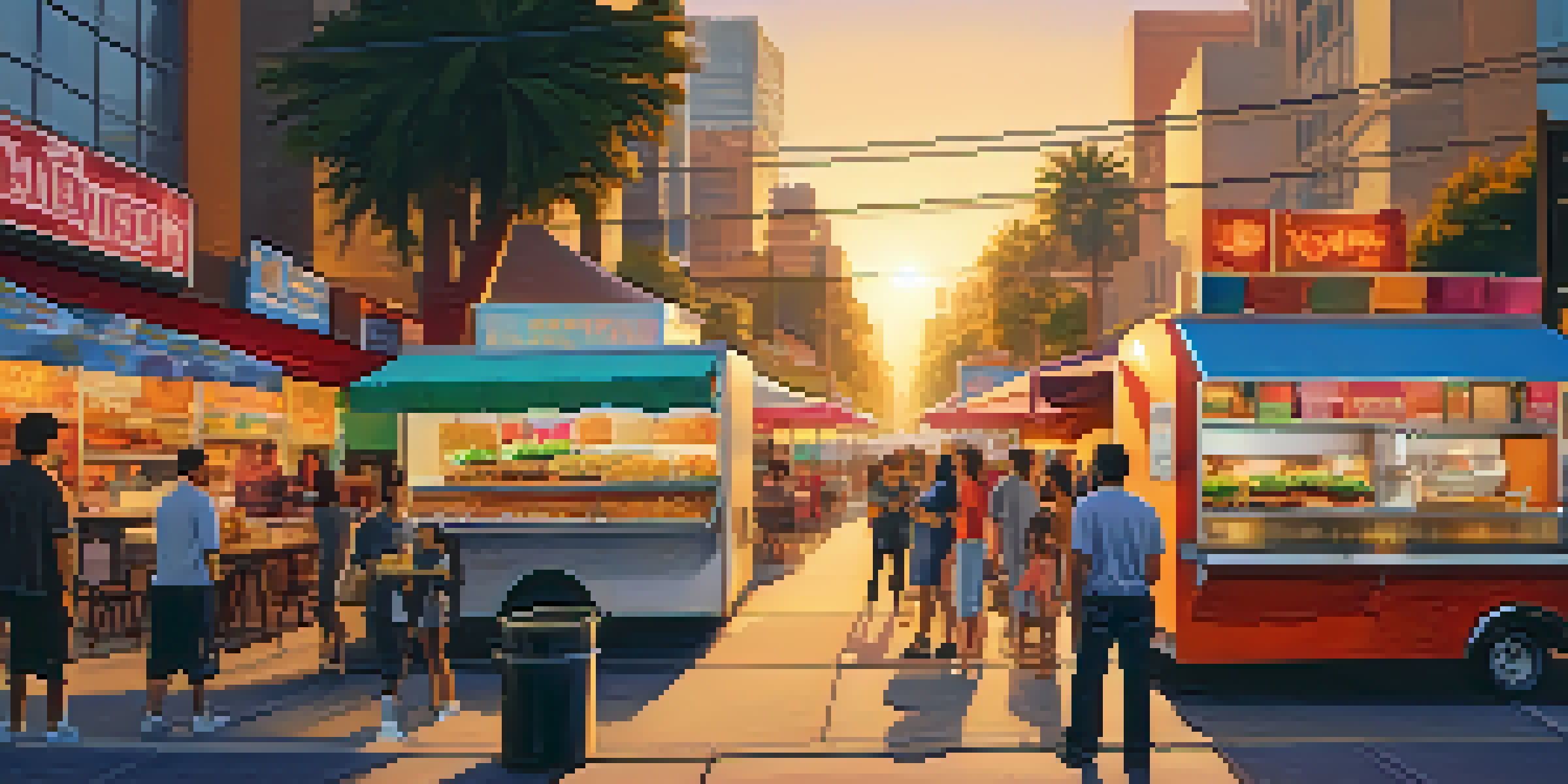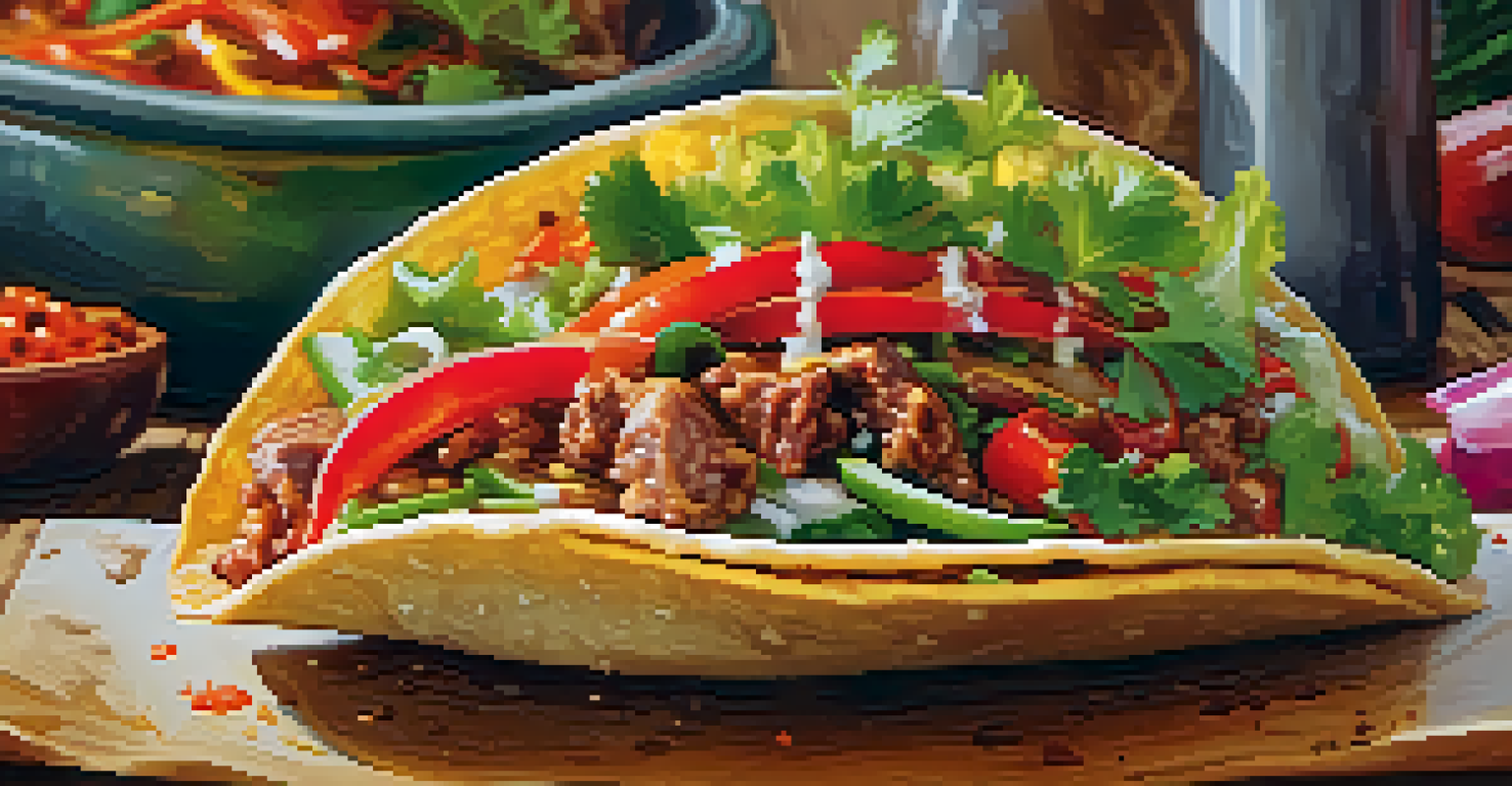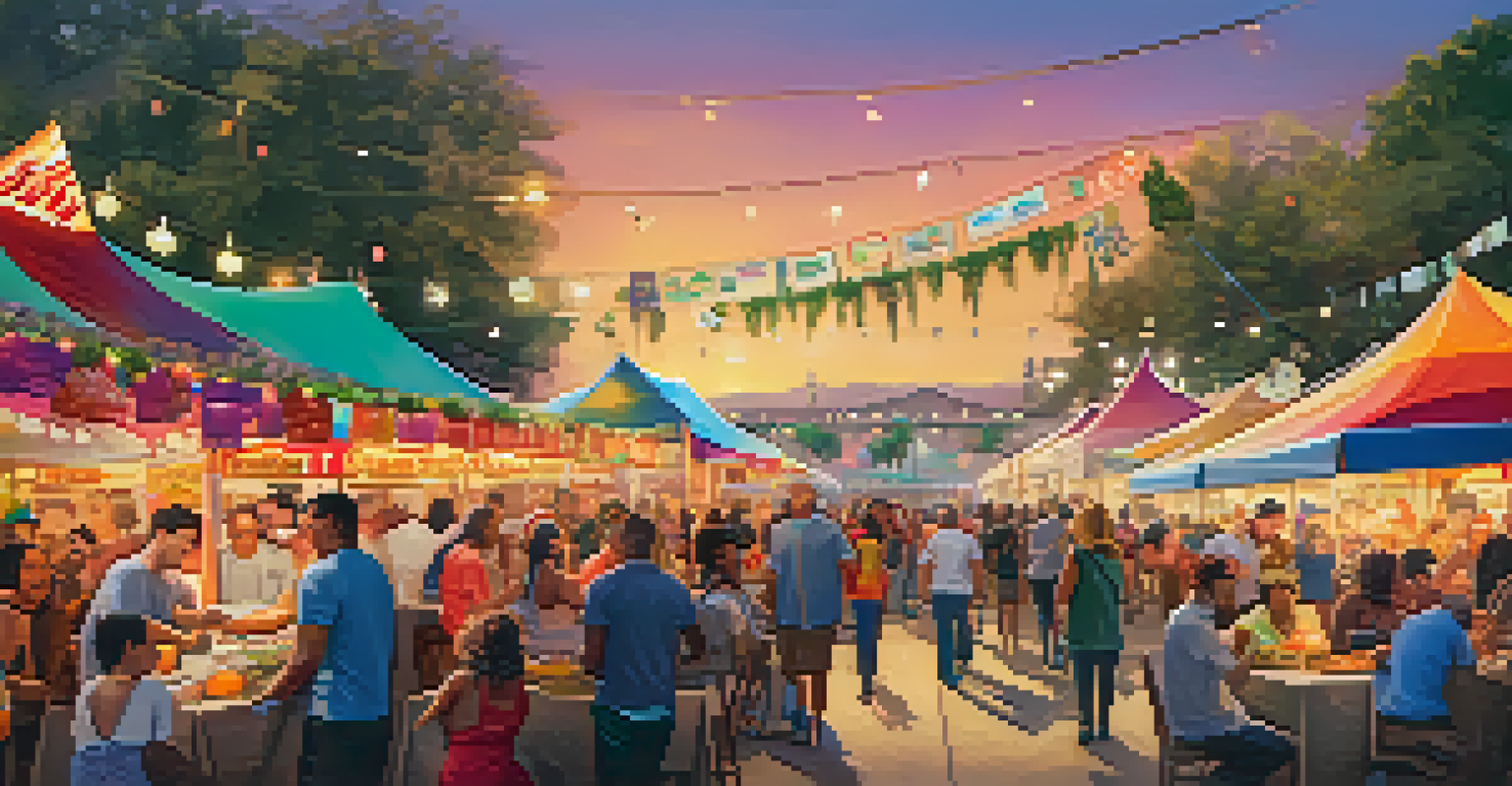Street Food Revolution: LA's Role in Global Culinary Trends

The Melting Pot: LA's Diverse Culinary Landscape
Los Angeles is often dubbed a melting pot, and nowhere is this more evident than in its street food scene. From taco trucks to gourmet food stalls, the city showcases an array of flavors reflecting its diverse population. This variety not only satisfies local appetites but also introduces global cuisines to a wider audience.
Food is a universal language that can connect people from all walks of life.
As you stroll through the bustling streets, you might encounter a fusion of Mexican, Korean, and Middle Eastern flavors all on one block. Each vendor brings their unique heritage and culinary traditions, creating a rich tapestry of tastes. This blend of cultures is a testament to LA's role as a culinary innovator.
Moreover, this diversity in street food not only enriches the local dining experience but also influences chefs and food lovers around the world. Many culinary trends that start in LA eventually find their way into restaurants and homes globally, proving the city's pivotal role in shaping what we eat.
Street Food as a Canvas for Culinary Creativity
Street food in Los Angeles is not just about satisfying hunger; it's also a platform for culinary creativity. Chefs and food entrepreneurs are constantly experimenting with flavors and presentation, turning simple dishes into art. This creativity is what makes LA's street food scene so dynamic and exciting.

For instance, take the classic taco: in LA, it can be filled with anything from traditional carne asada to unexpected ingredients like Korean BBQ or even sushi. This kind of innovation attracts food enthusiasts who are eager to try something new and unique. The surprising combinations often lead to delightful discoveries.
LA's Street Food Celebrates Diversity
The vibrant street food scene in Los Angeles showcases a rich blend of global flavors, reflecting the city's multicultural heritage.
As these inventive dishes gain popularity, they can spark trends that ripple across the culinary world. What starts as a quirky food truck offering can quickly evolve into a restaurant staple, showcasing how LA's street food scene serves as a breeding ground for culinary trends.
The Role of Social Media in Street Food Trends
In today's digital age, social media plays a crucial role in shaping food trends, and LA's street food scene is no exception. Platforms like Instagram and TikTok allow food vendors to showcase their creations, reaching a wider audience than ever before. A stunning food photo can go viral overnight, bringing newfound attention to a local vendor.
Street food is like a mirror reflecting the culture and creativity of a city.
This social media exposure often leads to long lines and sold-out items, as food lovers flock to try the latest trending dish. It also encourages a sense of community among foodies, who share their experiences and recommendations online. The power of social media has made street food not just a meal, but an experience worth sharing.
Furthermore, these platforms provide a space for feedback and interaction between vendors and customers. This direct communication can lead to further innovation as vendors adapt their offerings based on customer preferences and trending flavors.
Sustainability and Ethical Eating in Street Food
As the global conversation around sustainability and ethical eating grows, LA's street food scene is rising to the occasion. Many vendors are prioritizing local ingredients, organic produce, and eco-friendly practices. This shift not only supports local farmers but also aligns with the growing demand for healthier, more sustainable food options.
For example, some food trucks offer plant-based alternatives that cater to vegan and vegetarian diets, showcasing that street food can be both delicious and sustainable. By embracing these practices, vendors are not only appealing to conscious consumers but also setting an example for the wider culinary community.
Social Media Fuels Food Trends
Platforms like Instagram and TikTok amplify LA's street food offerings, turning local dishes into viral sensations that draw food lovers.
As more street food vendors adopt sustainable practices, they contribute to a larger movement towards ethical eating. This trend not only enhances the dining experience but also educates consumers about the impact of their food choices on the planet.
The Influence of Food Festivals on Street Food Culture
Food festivals in Los Angeles have become a vital part of the street food culture, bringing together diverse vendors and enthusiastic food lovers. These events provide a platform for street food entrepreneurs to showcase their offerings, often leading to increased visibility and opportunities. They create a festive atmosphere where people come together to celebrate culinary creativity.
At these festivals, attendees can sample a variety of dishes from different cultures, making it an immersive culinary experience. This exposure not only broadens palates but also fosters appreciation for the intricate stories behind each dish. It's a celebration of the city's rich culinary tapestry that keeps people coming back for more.
Moreover, food festivals often introduce new trends and flavors to the masses, as vendors experiment with unique dishes just for the occasion. As these innovations gain traction, they can influence menus far beyond the festival grounds, further solidifying LA's role as a trendsetter in the culinary world.
The Impact of Food Trucks on Traditional Restaurants
The rise of food trucks in Los Angeles has not only transformed the street food scene but also impacted traditional restaurants. These mobile eateries have challenged the norms of dining, offering gourmet meals at affordable prices and in casual settings. This shift has forced many established restaurants to rethink their strategies to stay competitive.
Food trucks often focus on niche markets and unique offerings, allowing them to attract dedicated followings. As a result, many traditional restaurants have begun to incorporate food truck-inspired dishes or collaborations into their menus, blurring the lines between casual and fine dining. This fusion of styles enriches the culinary landscape of LA.
Sustainability Shapes Future Menus
With a growing focus on sustainability, many LA street food vendors are incorporating local and eco-friendly ingredients into their menus.
Additionally, the success of food trucks has highlighted the importance of innovation and adaptability in the restaurant industry. As food trucks continue to thrive, they inspire traditional restaurants to embrace creativity and cater to evolving consumer preferences.
Looking Ahead: The Future of Street Food in LA
As we look to the future, the street food scene in Los Angeles is poised for continued growth and evolution. With the city's inherent diversity and a culture of innovation, new food trends will undoubtedly emerge. As chefs and entrepreneurs experiment, we can expect to see even more exciting dishes and concepts in the coming years.
Moreover, as awareness around sustainability and health continues to rise, many vendors are likely to adapt their menus accordingly. Whether it's through plant-based options, locally sourced ingredients, or eco-friendly practices, the future of street food will likely reflect a commitment to responsible eating.

Ultimately, LA's role in the global culinary landscape remains significant, influencing not only local diners but also food enthusiasts around the world. As street food continues to evolve, it will undoubtedly inspire the next generation of chefs and food lovers to push boundaries and explore new culinary horizons.